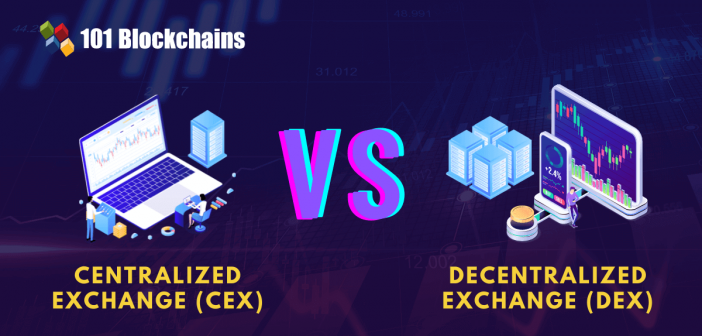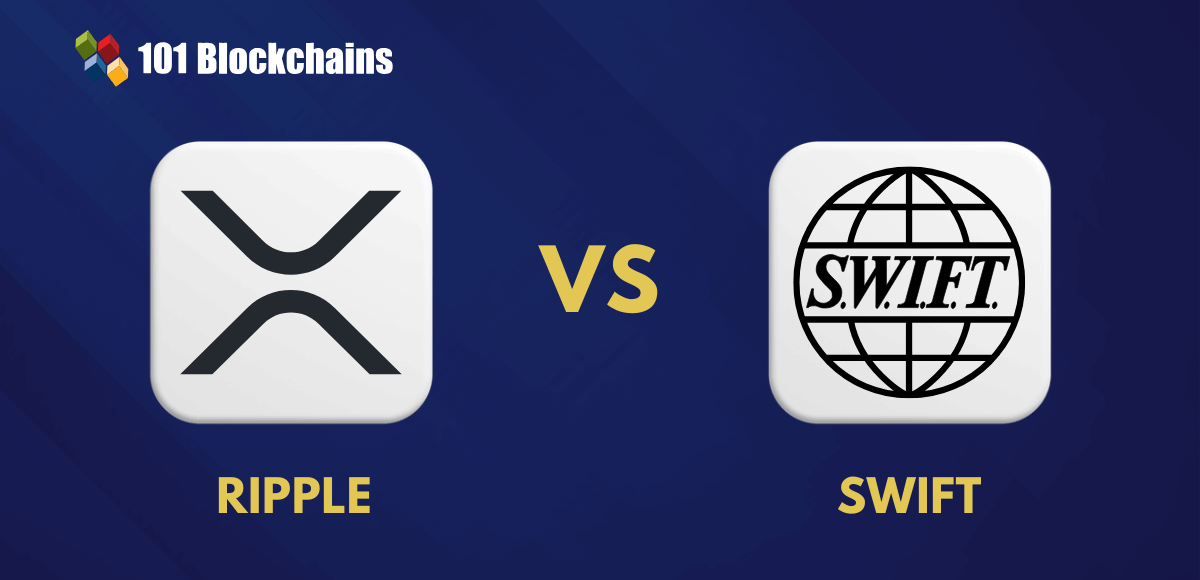Learn how blockchain truly works, master key definitions, and uncover what makes smart contracts so "smart." Dive into the fundamentals, gain valuable insights, and start your blockchain journey today!

Comparisons
Georgia Weston
on April 18, 2022
Centralized Exchange (CEX) vs. Decentralized Exchange (DEX) – Key Differences
Cryptocurrency exchanges serve as the gateway for any individual into the fascinating world of crypto assets. Crypto exchanges are the most common destination for purchasing and selling cryptocurrencies of your choice. However, the Centralized Exchange vs Decentralized Exchange debate has been making headlines in crypto news for valid reasons. Crypto users are confused regarding the choice of a suitable trading platform from the two popular categories. Which one is the better crypto exchange? You might wonder about the possibilities for finding a crypto exchange when both offer crypto trading facilities. While centralized exchanges might serve as one of the dominant forces in the crypto industry, decentralized exchanges are making their presence felt. Therefore, it is important to draw out a clear CEX vs DEX comparison to reach a suitable choice between the two. The following discussion presents a clear outline of the differences between centralized exchanges and decentralized exchanges in the crypto world.
Want to become a Cryptocurrency expert? Enroll Now in Cryptocurrency Fundamentals Course
What Are Crypto Exchanges?
Before an overview of the DEX vs CEX difference, let us go through a basic understanding of crypto exchanges. Crypto exchanges are basically the stock exchanges for the crypto world. Just like you can purchase and sell assets such as shares and derivatives on stock exchanges, crypto exchanges allow you to purchase and sell blockchain-based tokens and coins. The two notable types of cryptocurrency exchanges include the first-generation platforms, which were more centralized in nature, and the recently emerging assortment of decentralized exchanges.
While both the players in the CEX vs DEX crypto exchange debate offer the functionality for crypto trading, they differ in many other factors. For example, the type of exchange plays a crucial role in determining how a specific transaction works. At the same time, the features for the user and flexibility also differ considerably in the two types of exchanges. Therefore, a fundamental overview of the two types of crypto exchanges can set the perfect tone for a comparison between them.
Build your identity as a certified blockchain expert with 101 Blockchains’ Blockchain Certifications designed to provide enhanced career prospects.
What Are Centralized Exchanges?
As the name implies, centralized exchanges are crypto exchanges created by centralized organizations that exert control over ownership of the exchange. The centralized organization serves as the intermediary between buyers and sellers. Some of the common examples of centralized exchanges include Coinbase, Gemini, and Binance.
The most prominent highlight in the DEX vs CEX difference would obviously focus on how centralized exchanges actually work as banks. You can deposit your crypto in the central wallet of the exchange, which stays in the control of the centralized organization. Centralized exchanges also facilitate the documentation and execution of crypto trades on internal systems.
Centralized exchanges bring a wide array of benefits, including the ways in which they are suitable for crypto beginners. The user-friendly UIs and support of the centralized company behind CEXs offer the ease of recovering your crypto assets. In addition, centralized exchanges also provide the assurance of better liquidity with more users involved on centralized crypto exchange platforms.
On the other hand, centralized exchanges are not completely flawless in a CEX vs DEX debate, owing to their shortcomings. For example, centralized exchanges require KYC verification which violates the basic tenets of cryptocurrency, such as user anonymity. At the same time, centralized exchanges have all the deposited coins in the control of the company running the exchange. Therefore, crypto owners don’t have complete control over their assets on centralized exchanges.
Get familiar with the terms related to cryptocurrency with Cryptocurrency Flashcards
What Are Decentralized Exchanges?
The answers to “What is DEX and CEX?” are essential for drawing out a basic overview of the possible differences between them. Following the definition and overview of centralized exchanges, you must be eager to find out about decentralized exchanges. As the name implies, decentralized exchanges are basically the counterparts of centralized exchanges with a different structure. You can clearly guess that the decentralized exchanges are free from the control of any single entity, serving as intermediaries. On the contrary, decentralized exchanges are actually smart contracts tailored for offering peer-to-peer transactions.
The best thing about DEXs is that you don’t need any KYC verification to interact with them. You have a clear answer to “What is the difference between CEX and DEX” in the assurance of user anonymity with decentralized exchanges. The two notable categories of decentralized exchanges include order book DEXs and automated market makers or AMM DEXs. The first generation of decentralized exchanges followed the conventional order book model used in centralized exchanges.
Some of the common examples of order book DEXs include the Gnosis Protocol or LoopRing. The order book DEXs rely on algorithms rather than central platforms for discovering and moving transactions among individual users. Smart contracts helped in documenting the transactions on order book DEXs. Therefore, order book DEXs replaced the centralized organization with an algorithm and ensured decentralization. However, the order book model lacks in terms of efficiency, irrespective of the benefits of decentralization.
As a result, Automated Market Maker DEXs arrived on the scene to solve a notable issue with decentralized exchanges, i.e., liquidity. Some of the common examples of Automated Market Makers or AMM DEXs include Compound, Uniswap, and SushiSwap. AMM DEXs are a significant highlight in CEX vs DEX crypto exchange debates owing to their efficiency in replacing order books. Automated Market Maker relies on using liquidity pools sourced from users rather than waiting for matching buy and sell orders. The people who invest their assets in the liquidity pool receive governance tokens which also ensure distributed governance in the exchange.
Differences between Centralized Exchanges and Decentralized Exchanges

Please include attribution to staging2.staging2.101blockchains.com with this graphic. <a href='https://staging2.staging2.101blockchains.com/blockchain-infographics/'> <img src='https://staging2.staging2.101blockchains.com/wp-content/uploads/2022/04/Centralized-Exchange-CEX-vs-Decentralized-Exchange-DEX-Key-Differences.png' alt='Centralized Exchange (CEX) vs Decentralized Exchange (DEX) Key Differences'/> </a>
The detailed description of centralized exchanges and decentralized exchanges offers adequate information for comparing them. One of the first things you note in a centralized exchange vs decentralized exchange comparison is that DEXs have addressed many shortcomings in centralized exchanges.
At the same time, decentralized exchanges have also come up with some unique issues of their own. Therefore, you need a detailed comparison between CEXs and DEXs on the grounds of specific factors pertaining to their usability. Here are some of the notable points of difference in a comparison between centralized and decentralized crypto exchanges.
-
Custody of Assets
One of the foremost aspects in the answers to “What is DEX and CEX?” reflects on the custody of assets. Who has control over the crypto assets you deposit on a centralized or decentralized exchange? Do you hold your crypto assets directly in your ownership or place them under the control of the exchange?
In the case of centralized exchanges, you have to place your assets in the custody of the exchange before you start trading. Decentralized exchanges allow you to hold your assets with exclusive control over them. However, the non-custodial nature of decentralized exchanges also calls for focusing more on the security of your private keys.
-
Impermanent Loss
Decentralized exchanges provide a neat system for crypto trading with the facility of liquidity pools. However, the advantage of decentralized exchanges over centralized exchanges might have a prominent underlying risk. Liquidity providers are often exposed to the risk of impermanent loss in decentralized exchanges. Liquidity providers can only withdraw their share in the value of the liquidity pool rather than the number of tokens they invested in it.
The ratio of different crypto assets in the liquidity pool of DEXs changes frequently alongside the execution of trades. As a result, the liquidity pool can adjust to the market scenario with more tokens that are losing value. Subsequently, liquidity providers have to withdraw more tokens that have to lose value. You would not find the possibility for impermanent loss in centralized exchanges, thereby presenting a formidable advantage in CEX vs DEX comparisons.
Want to get an in-depth understanding of crypto fundamentals, trading and investing strategies? Enroll Now in Crypto Fundamentals, Trading And Investing Course.
-
Regulations
Even if DEXs have been soaring high in terms of popularity in recent times, they have been associated with some regulatory setbacks. How have decentralized exchanges become popular all of a sudden? The answer is clearly evident in the fact that decentralized exchanges have bypassed some of the regulatory obstacles.
The most evident answer for “What is the difference between CEX and DEX” focuses on how companies creating a DEX don’t follow KYC or AML standards. Autonomous operations of decentralized exchanges obviously free them from any concerns of KYC verification or AML procedures. However, institutional investors are less likely to exercise their interest in platforms that don’t follow KYC and AML compliance.
-
Liquidity
Another important highlight in CEX vs DEX crypto comparisons draws the limelight towards liquidity. You might have assumed that DEXs are the winners when it comes to liquidity, especially owing to the use of liquidity pools in AMM DEXs. However, there are many other concerns that affect the liquidity of decentralized exchanges. For example, decentralized exchanges have to struggle more in comparison to CEXs in the case of large investors due to regulatory insufficiencies.
New and emerging DEXs cannot compete with large and well-established centralized exchanges in terms of liquidity. Without the desired liquidity, decentralized exchanges are unsuitable for large orders owing to concerns of unprecedented additional costs or slippage. However, new aggregator and compliance protocols are gradually emerging as viable solutions to problems of liquidity on decentralized exchanges.
-
Trading Options
You can also find the DEX vs CEX difference in the case of trading options offered on the crypto exchanges. Centralized crypto exchanges provide a wide range of trading options for users, including crypto lending and borrowing, airdrops, futures trading, options, spot trading, and leverages. While some DEXs offer some of these trading options, most of the work on decentralized exchanges revolves around crypto lending and borrowing, and speculations.
-
Availability
The aspect of availability is also a crucial highlight in the centralized exchange vs decentralized exchange comparisons. Centralized organizations operate centralized exchanges and are more susceptible to crashes. For example, centralized exchanges can reduce access to users to minimize losses in the event of massive market crashes. On the contrary, decentralized exchanges don’t have any problems as they don’t have any intermediaries. You can always access DEXs, irrespective of market crashes, and use your assets as you want.
Start learning about Cryptocurrencies with World’s first Cryptocurrency Skill Path with quality resources tailored by industry experts Now!
Final Words
The final impression regarding the CEX vs DEX debate shows that decentralized exchanges have a long way to go. Decentralized exchanges have obviously emerged as an easier alternative than centralized exchanges. For example, you don’t need KYC verification or any pressure of entrusting the control of your crypto assets in the exchange. However, the advantages of decentralized exchanges also lead to some setbacks, such as a lack of trust from institutional investors.
On the other hand, centralized exchanges offer better ease of use with flexible user interface designs. As of now, centralized exchanges are the first point of entry for anyone interested in exploring the crypto space. However, decentralized exchanges have the potential to transform the future of crypto ownership and trading. Learn more about cryptocurrencies and explore the implications of crypto exchanges.
*Disclaimer: The article should not be taken as, and is not intended to provide any investment advice. Claims made in this article do not constitute investment advice and should not be taken as such. 101 Blockchains shall not be responsible for any loss sustained by any person who relies on this article. Do your own research!





